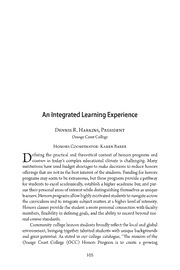
ERIC EJ1081020: An Integrated Learning Experience PDF
Preview ERIC EJ1081020: An Integrated Learning Experience
an Integrated learning Experience Dennis R . Harkins, President Orange Coast College Honors Coordinator: Karen Baker Defining the practical and theoretical context of honors programs and courses in today’s complex educational climate is challenging . Many institutions have used budget shortages to make decisions to reduce honors offerings that are not in the best interest of the students . Funding for honors programs may seem to be extraneous, but these programs provide a pathway for students to excel academically, establish a higher academic bar, and pur- sue their personal areas of interest while distinguishing themselves as unique learners . Honors programs allow highly motivated students to navigate across the curriculum and to integrate subject matters at a higher level of intensity . Honors classes provide the student a more personal connection with faculty members, flexibility in defining goals, and the ability to exceed beyond nor- mal course standards . Community college honors students broadly reflect the local and global environment, bringing together talented students with unique backgrounds and great potential . As stated in our college catalogue, “The mission of the Orange Coast College (OCC) Honors Program is to create a growing 105 orangE coast collEgE community of scholars in which highly motivated students and faculty engage in enriched academic and co-curricular experiences where students enjoy enhanced scholarship and transfer opportunities .” The OCC Honors Program is also recognized for its continuous outreach to the community in varying service learning activities . The connection between teachers and students in the honors program is one where all the students are challenged to follow their natural curiosity and to go beyond the scope of an assignment or project . In the OCC Honors Certificate Program, students are required to complete fifteen credits from across three different disciplines and to fashion an interdisciplinary approach in their study . Their honors classes afford students the opportunity to pursue individual interests, structure their own experiences, and have a specialized, valuable learning experience . To this end, the program attracts students who are self-directed and self-regulating . The honors program at OCC has been described as a “college within a college” with a focus on developing and expanding educational opportunities for highly motivated individuals and improving their prospects of transfer to the most competitive universities in the nation . The honors program does not exist in a vacuum and has strong ties with the Association of Core Texts and Courses, Honors Transfer Council of California, Western Regional Hon- ors Council, and National Collegiate Honors Council . OCC honors students also participate at the state honors conference held close by in Orange County at the University of California, Irvine . As educators, we strive to create an environment where students thrive and grow to maximize their potential . In community colleges, students can find a personally regulated, best-fit environment that combines instruction in general education as well as the applied arts . The honors program can provide integration in applied and non-applied pathways for students to expand their knowledge beyond what is required in program and course requirements . This diversity of opportunities is reflected in the program’s curriculum, which includes courses in the following disciplines: anthropology, architecture, art, astronomy, biology, business, English, French, geography, geology, history, humanities, Japanese, mathematics, marine science, photography, political science, psychology, sociology, and Spanish . Our honors program allows students from diverse backgrounds an ave- nue for community building, thus teaching students how to live in a globally dynamic world . Students here are admitted to the program based on aca- demic achievement or by the recommendation of a faculty member who may 106 an intEgratEd lEarning ExpEriEncE weigh the ability of the student in a more holistic manner . In addition, stu- dents who do not have the required GPA for the program can enroll in honors courses in order to be challenged at a higher level and interact with some of the highest-achieving students at the college . Our experience at Orange Coast College has shown that students are reasonably good at assessing their own academic talent, and when they feel restricted within the normal educational experience, they may pursue honors sections of courses as long as they meet prerequisites . Recognizing that there are many kinds of intelligence, our hon- ors program gives students room for creativity and discovery . With many international students in the honors program, students have an added cultural and global experience in examining academic and global issues, enhancing the critical thinking and the analysis of divergent points of view that occur in honors seminars . Other activities that are integral to creat- ing a broader perspective for students include guest speakers and trips to local lectures, galleries, and museums . Presidents can sometimes be skeptical, as I was when I first became involved with the honors program . Certainly all teachers should be creat- ing learning opportunities for students that challenge them at their highest level of achievement, so academically advanced students shouldn’t really need smaller classes or special opportunities . However, after becoming more connected with the faculty, seeing their passion, and listening to students describe their experiences, I am convinced that honors programs are not an add-on but a critical element of a comprehensive college experience for both students and faculty . acknowledgment Thanks to Teresa Scarbrough, Orange Coast College Honors Office Coordinator, for her contribution to this essay . ________________________________________________________ President Harkins may be contacted at [email protected]. 107
